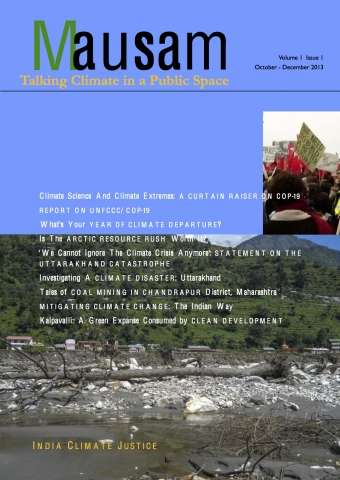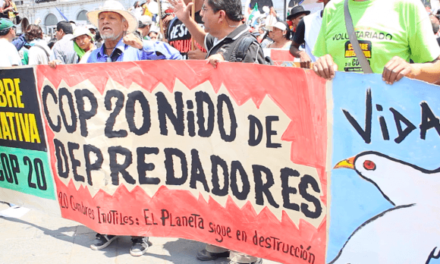Mausam is Here
A new e-magazine called Mausam is here. While it builds on the earlier magazine/effort that went by the same name, the new Mausam represents the voice of a larger collective. One hopes that in future it will be more consistent than the real mausam (climate) out there, and there will be at least three/four issues a year.
In Uttarakhand and the Cyclone Phailin, we have witnessed this year the unusual occurrence of two severe rainfall events: The first meant the tragic and also criminal loss of thousands of lives, and both badly affected untold number of livelihoods. For numerous individuals and organizations, the catastrophic deaths and damage in Uttarakhand – in which at least 10,000 people died – was a wake-up call to the dangers of global warming. It was a jolt for us in India Climate Justice as well.
It is in this sobering context that we launch this new e-magazine Mausam.
While the new Mausam might look and read somewhat different (many new people have joined the Editorial team), it would continue doing what it was doing before: to exorcise the climate issue of technicalities, myths and jargon, and bring the climate talks out in the open—into the public space. Because nothing of essence has changed in India since the first issue of Mausam came out in 2008—in fact the governmental callousness (and pro-corporate machinations) in tackling runaway climate change and informing the country’s people about the very real dangers they face became yet more visible in these intervening years: governments
including our own persist with filthy energy source like fossil fuel, large hydro and nuclear and think of promoting shale gas. The world’s climate system and the changes thoughtless government and corporate action is causing in it are people’s issues—Mausam will try to provide a people’s perspective to them. Besides articles on various issues related to climate change, its impacts, its
causes and solutions (both false and real), the magazine will try to contain news round-ups, news about social movements and event calendars.
At another level, Mausam will be truly a collective venture—India Climate Justice, the alliance process of many Indian social movements, unions, other groups and individuals that started in 2009, will run it. Resistance to a number of industrial, energy, and infrastructure projects— for instance in Kudankulam, Jaitapur, the Delhi-Mumbai industrial corridor, Cheyyur—grow, questioning the very process of mainstream ‘development’ that is being thrust on the people of this country. It raises a whole series of questions as to what appropriate development is or ought to be, a debate that will be reflected in Mausam. We welcome all readers to join in this debate, and appeal to activists and others to write in about struggles in their areas.
For the time being, Mausam will be published in English as an e-magazine, though thoughts of vernacular and print versions are very much there.
Let’s hope for a better Mausam next time.










